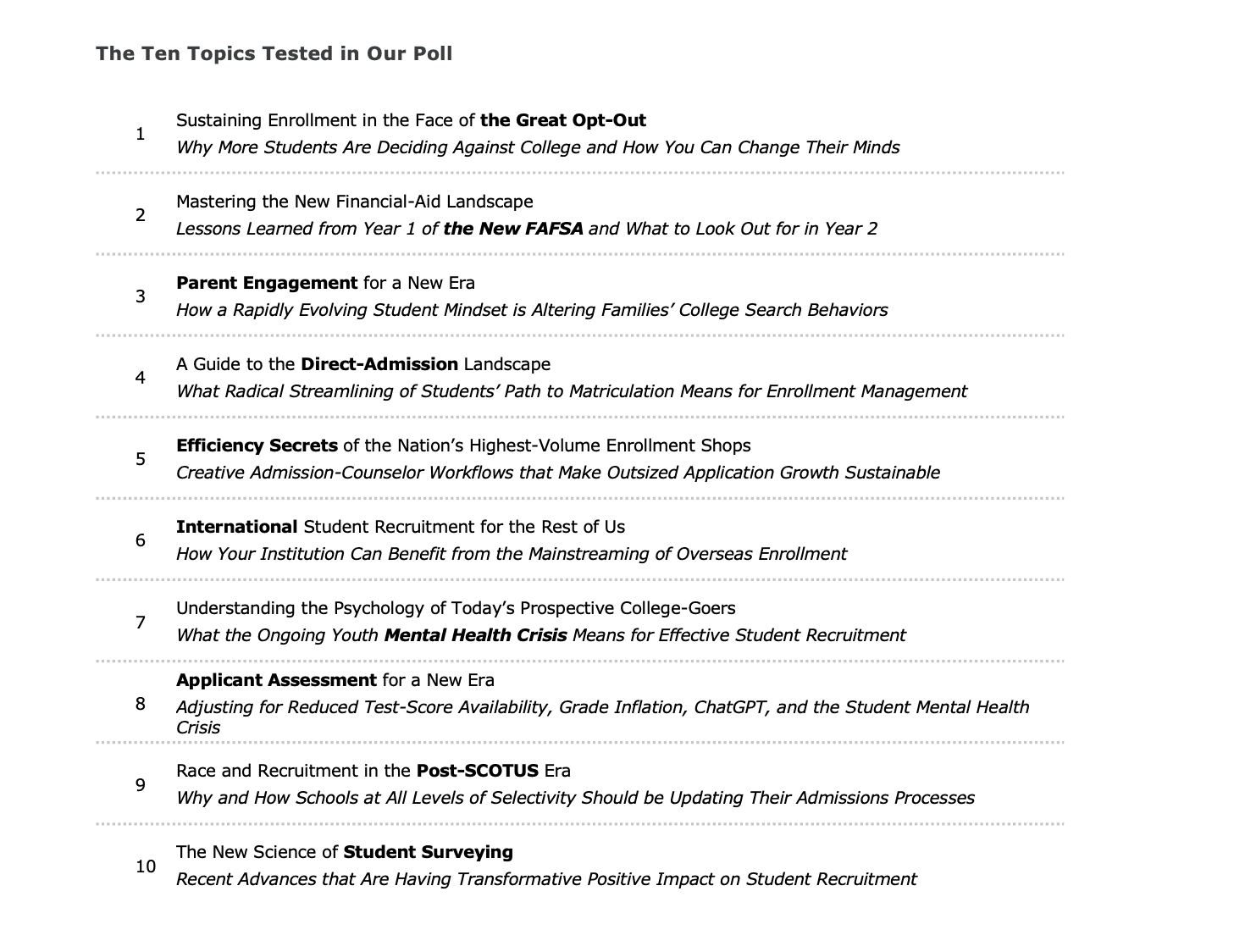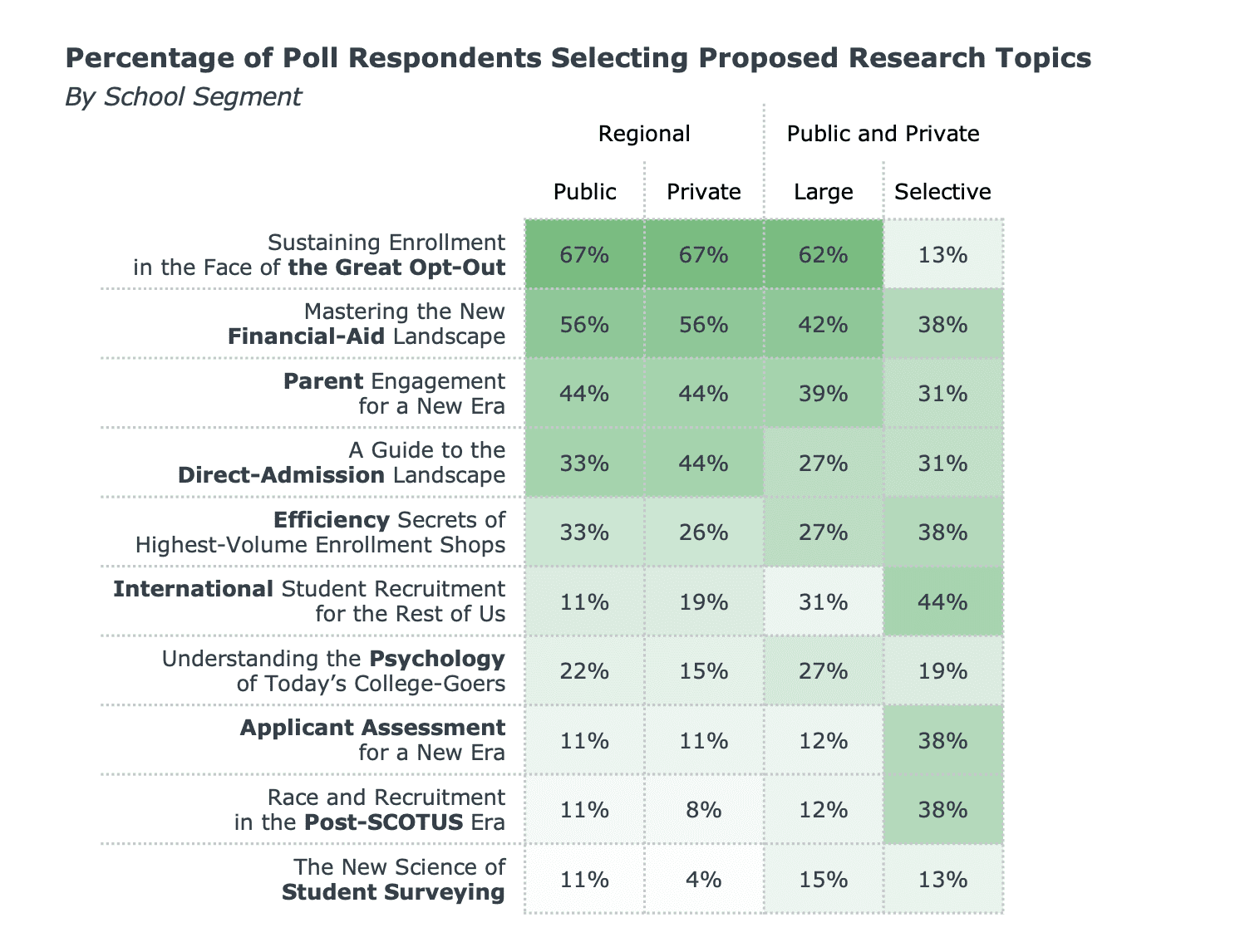Four areas enrollment leaders are prioritizing in 2024
A read on your peers’ most pressing concerns
Each year, EAB’s Marketing and Enrollment division conducts a survey of admissions leaders to guide our research and publishing focus for the coming months. This year we explored ten potential research areas, from non-consumption to international student recruitment. Below is some commentary on the four highest-ranking topics—those chosen by a third or more of respondents. Included are observations about how they resonated with schools of varying types (large and small, public and private, more and less selective).
1: Addressing non-consumption in college enrollment
Topping our poll, with 54% interest, was “Sustaining Enrollment in the Face of the Great Opt-Out: Why More Students Are Deciding Against College and How You Can Change Their Minds.” No big surprise here—similar topics addressing higher education’s value proposition have consistently topped the rankings in past years’ polls, usually by a wide margin.
One notable (if predictable) exception to the generally high interest in this topic was among respondents from highly selective institutions, just 13% of whom chose it. (The corresponding figure was upwards of 60% for less selective schools). It’s possible that these institutions’ prestige continues to shield them from rising higher ed non-consumption.
2: Navigating the revised FAFSA
The second most popular topic, chosen by 45% of respondents, was “Mastering the New Financial Aid Landscape: Lessons Learned from Year 1 of the New FAFSA and What to Look Out for in Year 2.” The popularity of this topic is undoubtedly a reflection of problems that have plagued the new FAFSA, including the weeks-long delay between the form being made available to students and data being made available to colleges and universities.
Interest in this topic was especially high among regional institutions, with 56% of respondents from both public and private schools in this segment having selected the topic—a possible indication of their financial aid teams being less generously resourced.
7 WAYS TO SUPPORT (AND YIELD) STUDENTS DESPITE THE FAFSA DELAY
3: The role of parents in college choice
Occupying third place, based on its selection by 39% of respondents, was “Parent Engagement for a New Era: How a Rapidly Evolving Student Mindset is Altering Families’ College Search Behaviors.” Given the profound transformation we’ve seen in college-aged youth recently, including greatly increased prevalence of mental health challenges, effective student recruitment has become more dependent than ever on their #1 influencer—a fact reflected in the popularity of the parent topic among our poll respondents.
In terms of variation across school segments, 65% of small schools cited it as a top concern versus just 29% of medium and large institutions. The discrepancy may be due to small schools’ longer experience with intensive competition over students and corresponding pressure on them to up their recruitment-marketing game, including more intensive parent engagement.
4: Direct admission
In the number four slot was “A Guide to the Direct-Admission Landscape: What Radical Streamlining of Students’ Path to Matriculation Means for Enrollment Management,” chosen by 34% of respondents. The past two years have seen a proliferation of programs that extend offers of admission to students without requiring them first to apply. Enrollment leaders are looking, with increasing urgency, for guidance on this complex and rapidly evolving terrain.
Interest in this topic was strongest among medium-sized, private, moderately selective institutions. It is possible that highly selective schools have yet to be convinced of direct admission’s ability to accommodate their typically comprehensive and idiosyncratic approaches to applicant review, while many less selective institutions may feel that their application processes already resemble direct admission in important respects (e.g., those that auto-admit students based solely on high school GPA and standardized test score).


Thanks to those of you who participated in the survey, which helps make sure we stay focused on your most pressing concerns. Keep an eye out for related content from our team in the coming months, and please share with us any thoughts you may have about our research agenda.
More Blogs

Students are engaging earlier. Enrollment strategies should follow.

Empower high school counselors to strengthen your recruitment pipeline
